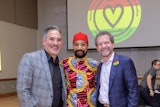COLUMBIA, S.C.
Kimberly Lucas slowly moves her arms and hands in whirling motions through the air, emulating the movements of nearly stagnant water.
A single spot light shines a ray of light on her face to reveal looks of fear and anguish.
These are the emotions that enslaved Africans must have lived with everyday, Lucas said.
They are also the feelings expressed by Black Americans who survived Hurricane Katrina only to find themselves trapped by rising flood waters and lack of transportation.
“It’s the same thing that happened at the bottom of the slave ships with urine, feces, dead bodies and people dying as they wallow in all that filth,” said Charles Brooks, a Benedict College assistant professor of fine arts.
Showing the comparison between Black slaves in early America and the Black victims of Hurricane Katrina is the premise behind a play Brooks wrote and recently directed called “Help!: The Storytelling of Bondage, Oppression and Refugees.”
The performance featured slave narratives prepared by the Federal Writers’ Project of the Works Progress Administrations and was held at Benedict’s Henry Ponder Fine Arts Center over the weekend.
Students like Marlena Johnson, a senior at the historically Black college, remember the images of people holding signs and shouting for help. She hopes the play will keep an issue that’s faded from the headlines in the forefront.
“It highlighted something very important,” she said. “The play lets people know that someone cares.”
But the play is meant to send more than a message of caring for the victims. Brooks says it is a cry for help from young Blacks — those too young to have experienced the struggle for Civil Rights.
And for those who are too far removed to understand the significant impact that slavery had on Black Americans, he said, Hurricane Katrina is a reminder of what it felt like to be treated less than human.
“Hurricane Katrina opened a lot of eyes. The play is meant for the same purpose. Young people need to be aware, get involved, grow from within, let their minds expand and be a benefit to their community and their people.”
Don Johnson, the play’s narrator, said he became interested in it as a way of taking a stand.
“The value of human life did not come to the surface for a long time in the eyes of many people watching on the news as well as people there on ground zero” Johnson said. “It’s the same kind of thought process that had to go on when human life could be so devalued that people could be sold as property,” he said.
Though the treatment of Blacks during slavery and Hurricane Katrina has fueled angry emotions among some groups, it’s not the reaction Brooks hopes to get from his play.
“The message is that now is the time for young people to stand up,” Brooks said, “Stand up … not just to one person or one issue. We need to stand up for ourselves.”
—Associated Press
© Copyright 2005 by DiverseEducation.com















